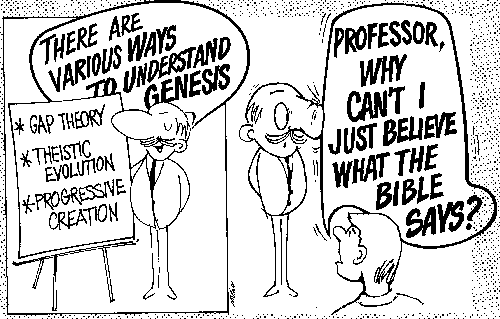
...but, my positive attitude in the opening paragraph is similar to the positive attitude of post-millennialists regarding the Gospel and the future. Post-millennialists believe in the triumph of the Gospel and the Church over the earth. Christ will return to a near-converted earth. Christianity will triumph. Some believe in a final rebellion at the end of history, but a great many modern post-mil Bible scholars do not. Here is a chart to give you a comparison with the first two positions we covered: dispensational premillennialism and amillennialism:

Before I go too far, let me back up. Post-millennialism (as I mentioned in my earlier post) shares much in common with amillennialism. It is a response to the difficulty encountered in trying to understand the early church's general perception that Christ's coming was to be soon, when in fact, it didn't happen (or it didn't happen the way they envisioned). See my three reasons for amillennialism's development in the earlier post if you can't remember :)
Most modern post-mil scholars are positive about the victory of the church at the end of this age. This was the minority position of the church throughout history. Most scholars throughout history believed there would be a final rebellion--this is why I said post-millennialism is a first-cousin to amillennialism. Look at the charts again:


There is just not much difference. Amillennialism's scheme of history goes like this:
1-4: See my dispensationalism blog
5. The Kingdom of God was initiated with the history of Jesus Christ. The Kingdom is the "Israel of God" (Gal.6:16) encompassing Jew and Gentile.
6. The church age will last an indefinite period.
a. Some interpreters see an increase of evil at the end of this age; some don't.
b. Some interpreters see a personal anti-christ; others do not.
c. Some interpreters see Israel turn largely to God near the end; some don't.
7. Christ will return at the end of the church age, judge all, and initiate eternity.
Postmillennialism's scheme of history goes like this:
1-4: See my dispensationalism blog
5. The Kingdom of God was initiated with the history of Jesus Christ. The Kingdom is the "Israel of God" (Gal.6:16) encompassing Jew and Gentile.
6. The church age will last an indefinite period, during which the church will triumph, converting massive numbers of people.
a. Some interpreters see an increase of evil at the end of this age; some don't.
b. Some interpreters see a personal anti-christ; others do not.
c. Some interpreters see Israel turn largely to God near the end; some don't.
7. Christ will return at the end of the victorious church age, judge all, and initiate eternity.
I am oversimplifying, but the difference of the victorious church is first and foremost difference here. Its also good to bear in mind at this point that dispensationalism views the reign of Christ on earth as a literal 1000 years on earth, while amillennialism and postmillennialism view it as an indefinite period of time within the present church age. The weaknesses of postmillennialism mirror that of amillennialism.
That is not the interesting stuff about post-millennialism though. The interesting thing about this system is the two main ways in which its holders have the interpreted the victory of the church to come about. These two ways are "revivalist" and "Christian reconstructionist."
Many Puritans were revivalists and believed the Gospel, as preached in the Reformation, would go to the ends of the earth, and covert huge numbers in the world. One would think they were basing this assumption on the success of the Reformation and the triumph of the evangelical Gospel in various forms of Protestantism. I honestly do not know. That's another blog. The point is that this is a bottom-up approach to converting the world in this system.
Christian Reconstructionism has emerged in the last century or so, and it takes the opposite tack--namely that Christians must take over the government, the arts, education, and all walks of society. Christians, instructed by the law of God in the OT and NT are the most capable of logically building a society in God's world, and will eventually do so, taking over every facet by entering the darkened world and lighting and rebirthing its every activity rooted in the Law of God and the Gospel of Christ. This position is called "theonomy"--rule of God.
Which ever of these positions a postmillennialist takes, they will be hated by the world! For the world hates Gospel preachers and Christians meddling in society. It's interesting to think about the implications...
Next time...historical premillennialism!
PS Most postmillennialists are Presbyterians.


















